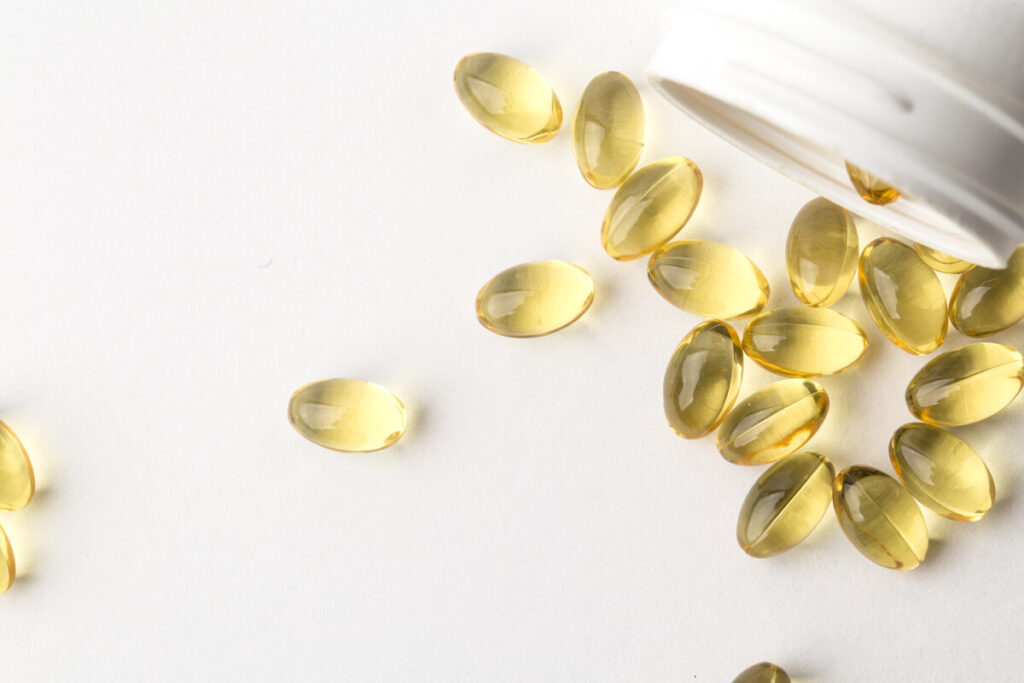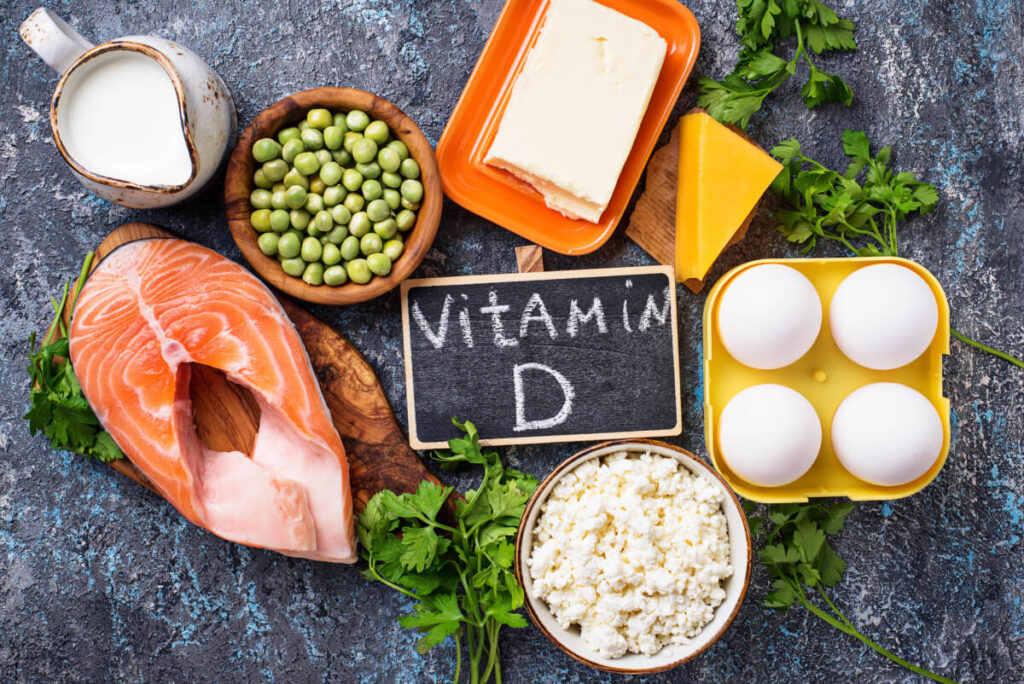Vitamin deficiencies don’t only cause health-related issues but can also lead to poor skin health and beauty problems. One of the frustrating effects of lack of vitamins is unhealthy scalp and hair. Although age, hormones, genetics, and stress are the primary reasons for poor hair growth, vitamin D deficiency has also been linked to some types of hair loss in both men and women.
So what’s the link between vitamin D and hair health? Vitamin D is thought to support active hair follicle cycling. In the growth or anagen phase of hair growth, vitamin D helps regulate cell regeneration to create new hair follicles from which the hair strands will grow. Maintaining sufficient vitamin D levels can promote the regrowth of thicker and healthier hair to prevent hair loss and thinning.
What’s The Relationship Between Vitamin D And Hair Health?
In general, vitamin D is an essential fat-soluble vitamin that’s required for the normal function of the organs, immune system, and overall health condition. Some of the ways that this important nutrient helps the body include:
- Allows the body to better absorb and retain calcium levels for strong bone health
- Reduces inflammation and protects against any autoimmune condition
- Promotes better cardiovascular and heart health
- Helps regulate mood and improves fatigue and low energy levels
- Contributes to skin repair by facilitating cell growth and improving protection against free radicals
Vitamin D for hair health provides the same benefits as it does in maintaining a good skin condition. The hair follicle is made up of different protein cells, and like all cells in the body, it relies on a steady supply of vitamins to sustain healthy follicles and grow stronger and thicker hair. Here’s a look at the 3 stages of hair growth and the role that vitamin D takes up:
| What Happens During This Phase? | What Does Vitamin D Do? | |
| Anagen phase (Growth) | This is the active stage where the stem cells and tissues rapidly regenerate to form new hair follicles. | The nutrient binds itself to vitamin D receptors in the hair follicle cells and stimulates the keratinocytes to grow new hair. It keeps the follicles healthy to prevent premature hair fall and thinning. |
| Catagen phase (Transition) | During this phase, hair growth begins to decrease as the follicle detaches itself from its blood supply and shrinks. | The vitamin D receptors in the cells continue to regulate the progression of the hair growth cycle. At this stage, it maintains hair growth before it enters the resting phase. |
| Telogen phase (Resting) | In this stage, hair follicles are temporarily dormant and there are no hairs that grow from the roots. It can last for about three months after which new hair strands will begin to grow in the follicles. | While there’s no new hair growth in the telogen phase, vitamin D still plays a role in preparing the follicles for the start of the new anagen phase. Healthy amounts of vitamin D remain necessary to promote the continuous hair growth cycle to reduce the risk of hair loss problems. |
Can Having Inadequate Vitamin D Cause Hair Loss?

Hair thinning, shedding, receding hairline, and patchy bald spots are all signs of hair loss. However, not all people can experience the same form of hair loss and only select types of hair problems can be caused by low vitamin D levels. Here are some of the common hair loss issues that may be related to lack of vitamin D:
Alopecia areata
Alopecia areata is a hair loss condition that is primarily caused by an autoimmune disease. It usually happens when the body’s immune system attacks the healthy hair follicles, cells, and tissues. If you experience unpredictable amounts of hair falling or see patchy hair loss on the scalp, you probably have alopecia areata.
According to one study, individuals with low amounts of vitamin D can have an increased risk of having alopecia areata. This is probably due to the role of vitamin D in regulating autoimmune conditions and without sufficient nutrients, your body and scalp health can become compromised and cause hair to fall out.
Androgenetic alopecia
Androgenic alopecia, also known as male pattern baldness or female pattern hair loss, is a type of condition that progresses with age. In men, this type of hair loss can begin during their puberty and can worsen in their later years while females can experience it as part of their natural aging.
Male pattern baldness can begin with a receding hairline and progress to bald spots on the scalp while for women, it usually only occurs as severe hair thinning on different parts of their scalp.
Several research studies already suggest that people with low serum vitamin D levels are more susceptible to pattern baldness since their follicles don’t get adequate vitamin D and other nutrients to support normal hair regrowth.
Telogen effluvium
This is a condition characterized by excessive hair shedding and hair thinning. This usually happens when numerous hair follicles remain in the resting or telogen phase of the hair growth cycle. The next stage of hair growth doesn’t begin and a large number of hairs can fall out from the scalp.
Different factors can cause telogen effluvium to happen such as extreme stress, traumatic life events, medications, and chronic illnesses. Some researchers have also suggested that low serum ferritin levels and the prevalence of vitamin D deficiency can lead to this hair loss condition. Lack of other nutrients and minerals like zinc and iron deficiency can also cause female hair loss and telogen effluvium.
How Do You Know If You’re Lacking Vitamin D?

If you have hair loss but you’re not especially at risk for other possible causes, it’s possible you may be vitamin D deficient. You can visit your healthcare provider or doctor to undergo medical screening for vitamin D levels.
The specific type of examination that can be performed is the 25-hydroxyvitamin D (25-OH D) test where a physician can simply draw a blood sample from your arm. This blood test is considered one of the most accurate ways to determine and monitor the amounts of vitamin D in your body.
Significantly low amounts of vitamin D could mean that an individual is not getting enough of the nutrients in their body. It could also show that they have poor absorption of vitamin D which can point to other possible health disorders. Hair loss is one of the most common symptoms of vitamin D deficiency but people may also experience the following signs:
- Fatigue and exhaustion
- Muscle pain
- Weak bones and loss of bone density
- Slow wound healing
- Blood pressure changes
- Mood changes and anxiety
- Accelerated skin aging
- Frequent acne breakouts and skin rashes
People who spend most of their time indoors are particularly at risk of vitamin D deficiency since they aren’t getting enough natural sunlight. Other factors can point to increased vitamin D deficiency like obesity, older age, darker skin type, pregnant or breastfeeding women, medical conditions like chronic kidney, liver disease, or Crohn’s disease, and a history of gastric bypass surgery.
Two Common Treatments To Combat Vitamin D-Related Hair Loss

Hair loss that is caused by the lack of vitamin D can be treated by taking hair growth supplements. This particular vitamin is available in different forms and it comes in various hair care products today. Here are some of the ways that vitamin D supplementation can be taken for hair loss:
Oral supplements
The most common type of vitamin D supplementation is taking oral medications. Doctors may recommend regularly taking multivitamins in capsules or tablets to increase the daily vitamin D intake. Vitamin D2 and vitamin D3 are the most important forms of this vitamin, and a healthcare provider can prescribe supplements to prevent deficiencies.
The recommended daily doses of vitamin D are between 400 to 800 IU (international units) but some patients may be prescribed to get up to 2000 IU if they’re not having enough sunlight exposure. Most supplements contain an average of 400 IU so they’re sufficient to maintain the level of vitamin D between the appropriate dietary allowance.
Topical hair care creams
Vitamin D is also available in hair growth creams and lotions that can be applied directly to the scalp. Calcipotriol is the most common hair growth product that’s a derivative form of vitamin D and it’s said to help improve alopecia conditions by easing the inflammation on the scalp.
Is Vitamin D Supplementation For Hair Safe?
While having too low levels of vitamin D is alarming, taking too many nutritional supplements may also be potentially dangerous especially if an individual’s blood levels exceed a certain amount. Vitamin D toxicity can occur when there is a buildup or excessive amounts of calcium in the blood. This can lead to uncomfortable symptoms such as nausea, vomiting, and general body weakness.
This can happen when a patient takes vitamin D supplements without proper doctor supervision. Increasing your vitamin intake without monitoring them may lead to higher levels that exceed the allowance for vitamin D. So before deciding on taking vitamin D medications or topical creams, it’s always best to consult with a doctor who can recommend the right products and adjust the appropriate dose to safely treat hair loss symptoms.
Alternative Sources Of Vitamin D That Can Help Prevent Hair Loss

The safer and more natural method of increasing vitamin D levels is by changing up your diet. Incorporating more vitamin-rich foods is the best way to ensure that you are meeting your daily required dose of vitamin D. Here are some of the common food sources of vitamin D that are also beneficial for hair health:
1. Oily and fatty fish meat like salmon and sardines
Fish meat contains a healthy amount of vitamin D and it’s one of the ideal food products to consume to fight vitamin deficiencies. They are also packed with omega-3 fatty acids and other nutrients like vitamin B-12, iron, and zinc that can prevent hair loss and strengthen follicles for healthier hair growth.
2. Egg yolks
Eggs are also enriched with proteins, healthy fats, and nutrients, with one serving containing at least 37 IU of vitamin D. To get its whole benefits, it’s important to consume the whole egg and not just the whites portion. Some people have also been using egg yolks as a topical scalp treatment to combat hair loss. It’s been suggested that using it as a hair mask may have benefits for reducing hair damage and moisturizing the scalp.
3. Beef liver and cod liver oil
Liver foods contain a high amount of vitamin D so they’re typically suggested for dietary supplements. Any serving of red meat such as beef liver has 36 IU of vitamin D, and they also have protein that helps nourish the hair follicles.
On the other hand, cod liver oil is a supplement that is rich in different nutrients including vitamin D, vitamin A, and essential fatty acids. They can help promote the growth of shiny hair, as well as maintain healthy skin with its antioxidant properties.
4. Fortified foods such as dairy products
Fortified foods mean that they’re enriched with additional micronutrients to provide a boost to their health benefits. Some of the common examples of fortified foods are breakfast cereals, dairy products like soy milk, oatmeals, and orange juice. Most of them contain vitamin D so they’re a great complement to your diet to increase your daily intake.
Buy PEP Factor and Other Hair Rejuvenation Supplies at FACE Med Store
Vitamin D has a major role in hair growth and taking supplements could be beneficial for restoring hair health and avoiding alopecia. However, it can’t be the only solution you should rely on for treating hair loss. Hair growth supplements could work better when taken along with the appropriate hair loss treatment for better results.
At FACE Med Store, we offer PEP Factor products for skin and hair rejuvenation. It contains a mix of peptides, nutrients, and other essential growth factors that can stimulate hair follicles to encourage natural hair regrowth. To know more about how to supply PEP Factor to your practice, call us today.
Read More: How Long Does It Take Vitamin D To Help Hair Growth?






